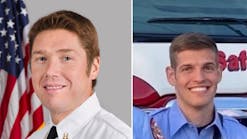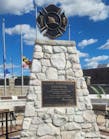We celebrate our 30th anniversary this month. In 1976, Dennis Smith had a vision, made a statement and we have been here ever since. We thank all those who worked on the magazine, all the subscribers, advertisers, the contributing editors, correspondents, photographers and heroism program sponsors for believing in us. We have come a long way from being just entertaining, with crossword puzzles, recipes and collectibles. We consider ourselves to be educational with nationally recognized fire service leaders reporting monthly and bimonthly and presenting timely reviews of major incidents and local on-the-job reports.
We asked our contributing editors to answer questions regarding the fire service over the last 30 years and where they see us going in the next 30 years. Starting on page 82, this is very interesting reading from a “Who’s Who in the Fire Service.†We and our readers are lucky we have them. Also to commemorate our anniversary, Founding Editor Dennis Smith describes the magazine’s creation and earliest days (see page 62), and Barry Furey remembers what the fire service was like in 1976 (see page 66). How many remember rubber turnout coats, three-quarter-length boots and riding on the back step of apparatus? They seem so foreign today.
The latest battle on Capitol Hill is taking shape and for a good cause: to fund the fire service. Senator Charles Schumer (D-NY) has proposed a petition to enlist signatures of every firefighter in New York State to counter the administration from cutting the FIRE Act grant program, and it is hoped that a grassroots effort will take hold across the country. Go to http://cms.firehouse.com/content/article/article.jsp?sectionId=46&id=50219 to sign it.
In the months following Hurricane Katrina, numerous flood-damaged homes in New Orleans have been burned. District Chief Chris Mickal presents some up-close and personal pictures of the latest spectacular blazes (see page 54). Firehouses are still uninhabitable and firefighters are living in trailers. Some companies are out of service because no rigs are available. The floodwaters and the storm may be gone, but it looks like it will be years before the fire department gets back to normal.
When this issue is mailed, Chief Alan Brunacini will have retired after 48 years of service to the Phoenix Fire Department, where he had been chief since 1978. Unassuming, always listening, famous for scribbling notes on napkins while engaged in conversation with fire service folks, Brunacini is one of a kind. He taught incident command on weekends all over the country in little towns and cities, always observing what was going on. Whenever he returned from a trip, he would describe to his senior staff his newfound information, tactics, training, ideas and theories. Change should be his middle name. You don’t have to agree with him, but he has done so much for the fire service and will continue to do so. I, like so many others, am fortunate to know him. Congratulations to Bob Khan, who takes over as Phoenix fire chief.
Already, the 2006 wildfire season has been much more severe than in years past. Through July 10, there were 61,653 fires, compared to an average of 43,961 in years past. More than 4 million acres have been burned; in a more typical year, that number stands at just under 2 million. Watch upcoming issues for coverage of these campaign events.
While reporting on the First Interstate high-rise fire in Los Angeles in 1986 and the Rodney King riots in 1993, I worked very closely with Los Angeles Fire Department Chief of Operations Don Anthony. He recently passed away. Chief Anthony served the LAFD proudly from 1956 through 1997, and he was a pleasure to work with. When discussing a plan to impose a curfew amid the riots, he counseled, “If you are not LAPD or a milkman delivering milk, there is no reason for you to be out on the streets in the middle of the night.â€
R. David Paulison, former Miami-Dade fire chief and past president of the International Association of Fire Chiefs (IAFC), promised “to make America proud†of the Federal Emergency Management Agency (FEMA) when he was sworn in recently as chief of the agency that bore the brunt of the blame for the government’s sluggish response to Hurricane Katrina. We wish the chief good luck in his new assignment.





